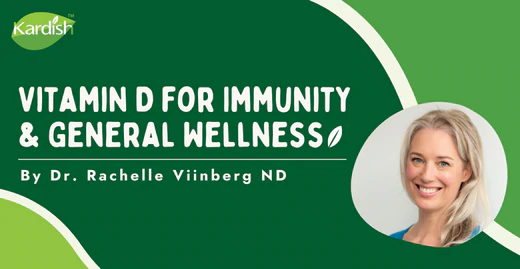
An Olympic champion and naturopathic's guide to Vitamin D
As a naturopathic doctor and Olympic champion, people often ask me, “What is the number one supplement you recommend?” This is a complex question because everyone’s health needs are different. However, I often begin the conversation with, “Have you had your Vitamin D levels checked lately?”
Vitamin D deficiency is shockingly common—and risky
Vitamin D is a nutrient that is synthesized from sunlight and is critical to our health. In fact, every single one of the 37 trillion cells in your body requires Vitamin D. However, 1 in 3 Canadians are deficient in Vitamin D, according to Statistics Canada. We just don’t get enough sun.
Low Vitamin D is risky
This is concerning because low Vitamin D can pose serious health risks, especially when combined with a sedentary lifestyle, ageing, or obesity. Low levels contribute to heart disease, diabetes, depression, thyroid conditions, asthma, migraines, muscle and bone pain, certain cancers, hair loss, and acne. And this list just scratches the surface—more research comes out each day about the importance of Vitamin D.
Vitamin D and your immunity
One of the major ways your body uses Vitamin D is to support your immune system. Those who are deficient in the nutrient get sick more frequently and experience higher incidences of autoimmune diseases such as allergies, arthritis, and multiple sclerosis. Most recently, low Vitamin D has been correlated with an increased severity of COVID-19 symptoms (researchers are now determining if this correlation is clinically significant).
The sunshine supplement
The bright spot is that it’s easy to improve your general health and immunity by adding more Vitamin D to your wellness regimen. Unfortunately, it’s difficult to get enough Vitamin D from diet alone. For example, you would need to eat about 8-9 ounces of herring per day to get enough Vitamin D in the winter. Unless you’re an orca, this is highly unrealistic. Instead, consider a Vitamin D supplement, available at Kardish locations across Ottawa.
Not all Vitamin D is created equally
There are two forms of vitamin D, which differ depending on their foods sources. Vitamin D3 is only found in animal-sourced foods, whereas D2 comes from plant sources and fortified foods. Since vitamin D2 is produced cheaply, it's the most common form in fortified foods. Unfortunately, it is also poorly absorbed.
That’s why I recommend supplementing with Vitamin D3, which can be found at all Kardish locations across Ottawa. A typical dose starts at 1,000 IU, but for many, this is not high enough to make a difference. Consider getting a Vitamin D serum test to take out the guesswork.
This article does not substitute professional advice. You should always consult a healthcare provider prior to taking a new supplement. We are here for you on your health journey!
About Dr. Rachelle Viinberg ND
As an Olympic athlete and naturopathic doctor, Dr. Viinberg deeply understands peak performance. She’ll help figure out your path and assist with the motivation to get you there. Learn more: https://drkristylewis.ca/our-approach/
